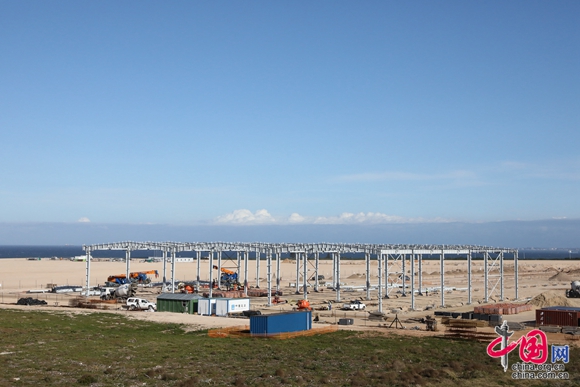Automaker rebuts allegations in South African joint venture
- By He Shan
 0 Comment(s)
0 Comment(s) Print
Print E-mail China.org.cn, August 22, 2017
E-mail China.org.cn, August 22, 2017
 |
|
The construction site of the car plant of Beijing Automobile International Corporation in Coega, South Africa. [Photo by Xing Yihang/China.org.cn] |
Beijing Automobile International Corporation (BAIC), one of China's largest automakers in terms of sales, said its new auto plant in Coega, South Africa, has no delays and the project is moving forward in accordance to an earlier agreement and local regulations.
The statement came after a spate of allegations from local partners over problems involving procurement and language differences that are hindering communication between the parties.
As one of China’s largest single-investment projects in Africa, BAIC Automobile South Africa, the joint venture between BAIC and South Africa’s Industrial Development Corporation (IDC), has a total plant investment of US$226 million with the former holding 65 percent stake and latter the remaining 35 percent.
The Nelson Mandela Bay branch of the National African Federated Chamber of Commerce (Nafcoc) claimed that BAIC has sidelined and undermined its members, rendering them as "useless" and "unworthy" of being involved in the project.
Also, IDC CEO Geoffrey Qhena earlier complained about BAIC importing building materials from China instead of sourcing them from South Africa.
In response, Li Xingxing, executive vice president of BAIC International Development Co., Ltd., said the project needs a huge amount of building materials like steel, which is both expensive and supplied in comparatively small quantities locally.
Li said steel structure is imported from China according to an earlier agreement and only accounts for 13 percent of the entire project, and other construction facilities are all sourced locally.
BAIC welcomes cooperation with local small and medium-sized enterprises (SOEs) in material supplying, he added.
So far, over 30 such companies have been authorized to contribute to the project.
In response to the accusation of the project’s delays,Li explained the plant has begun construction on schedule and the first phase is expected to complete in June 2018.
After the plant begins its full operation, it is expected to provide 800 jobs, of which 98 percent will be hired locally.
"The biggest challenge lies in how we, the Chinese, could build it into a local company and adapt to local conditions," Li said. "And this may need a change of mindset as well as practice."






Go to Forum >>0 Comment(s)